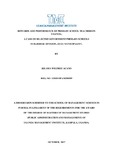| dc.description.abstract | Guided by the process theories of motivation, the researcher sought to establish the relationship between rewards and performance of teachers in government primary schools in Bardege Division, Gulu Municipality. The three objectives were to find the relationship between: (i) non-monetary rewards (ii) monetary rewards (iii) Teachers’ perception of rewards and the performance of teachers. Rewards were taken as the independent variable while teachers’ performance was the dependent variable.
The review of literature on rewards as the independent variable and performance of teachers as the dependent variable was done and presented according to the stated objectives. From the empirical studies presented in the literature review most studies agree with the findings and conclusion of this study that, there is a significant relationship between rewards (both nonmonetary and monetary) and teachers’ Performance.
The target population included the following categories: Teachers, Head teachers, Chairpersons of Schools Management Committees, Chairpersons Parents Teachers’ Associations, Municipal Inspector of Schools and the Coordinating Center Tutors. By use of descriptive correlation case study design employing both qualitative and quantitative research approaches, Data was collected from 52 respondents across the different categories using questionnaires, interviews and observation as the tools for data collection.
Both quantitative and qualitative data were collected, analyzed, presented, interpreted and triangulated to derive meanings and draw relevant conclusions. Graphs and tables were used to present the data. Descriptive statistics, namely percentages, mean and standard deviations were used to present the quantitative data. With the help of Statistical Package for Social Sciences (SSPS version 16) the correlation and regression analysis were performed to establish the relationship between the variables and the predictive effects of rewards on performance. Test of hypotheses showed significant positive relationships between (i) nonmonetary (ii) monetary rewards (iii) teachers’ perception of rewards and the performance of teachers in these schools.
Through the regression models it was found that 43.9%, 57.7% and 36.5% of changes in teacher’s performance may be explained in terms of non-monetary rewards, monetary rewards and the perception teachers have about the rewards respectively. Using the findings the researcher came up with a number of recommendations on the use of both non-monetary and monetary rewards for improving teachers’ performance in schools. These recommendations apply to Ministry of education and sports, Head teachers, Parents and School Management Committee | en_US |

